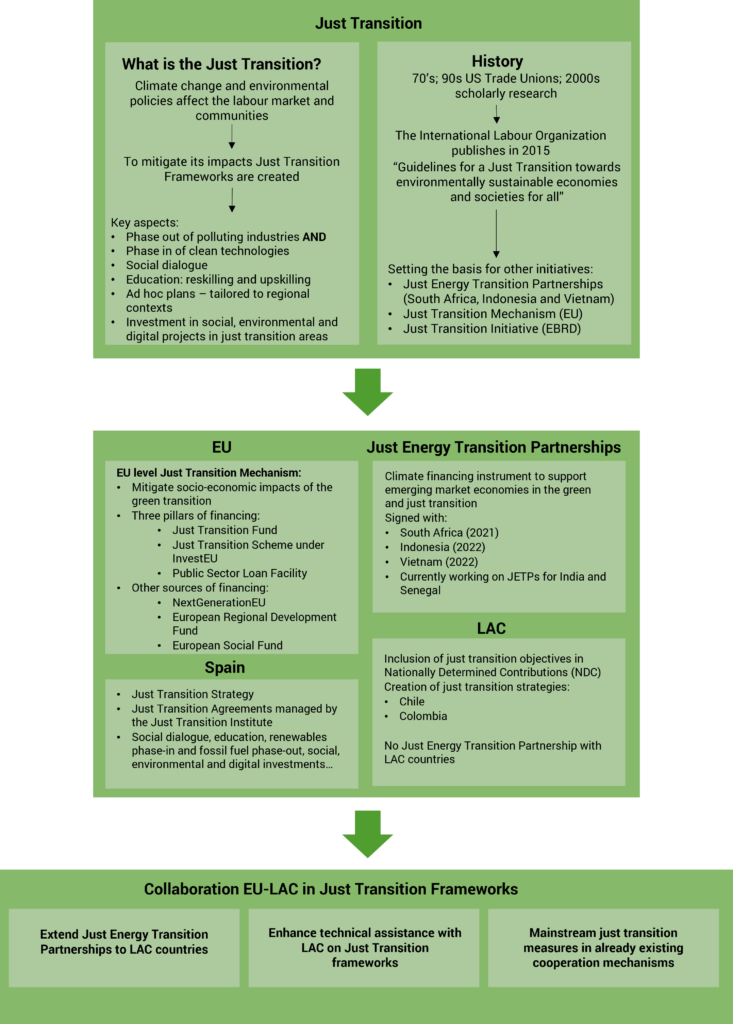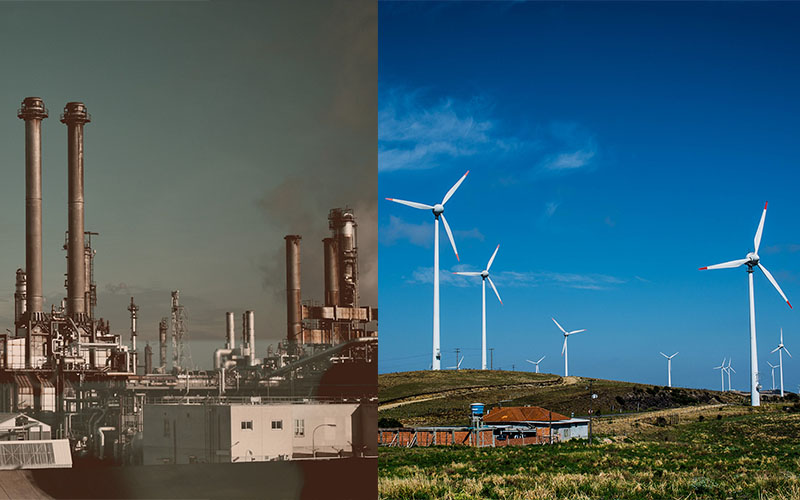Executive Summary
This policy paper analyses the key elements of the just transition at the global, regional and national levels. It focuses on ways to strengthen collaboration between the EU and LAC, given both the European Green Deal’s (EGD) goal of transitioning to a net-zero development model that leaves no one behind and the EU’s New Agenda for Relations between the EU and Latin America and the Caribbean, an agenda that highlights the need to jointly address the external impacts of the EGD.
Climate change and environmental policies are rapidly transforming the fabric of the current development model, affecting workers and communities alike. To mitigate the impacts of the low-carbon transition, just transition strategies are being developed around the world, producing novel institutions and policies that seek to mitigate the impacts of the largest structural change since the industrial revolution. Just transition strategies typically include education (reskilling and upskilling[1]), investment in social, environmental and digital projects, and support for companies to promote the economic diversification of the supported regions. These initiatives are developed on an ad hoc basis to suit the specific needs of each region in transition. Just transition strategies are based on social dialogue and focus on the phase-out of polluting industries as well as on the phase-in of clean economic alternatives.
A range of international and national authorities have created and are implementing just transition frameworks. At the international level, Just Energy Transition Partnerships (JETPs) have been signed with South Africa, Indonesia and Vietnam. Their objective is to support emerging market economies to reach a green and just transition. Developed and developing economies as well as international stakeholders have shown great interest in this climate financing mechanism owing to its potential to put people at the core of the green transition, increase climate finance and promote public-private partnerships. At the EU level, the Just Transition Mechanism has been put in place to support Member States’ transition to a net-zero economy. Various countries worldwide have included just transition measures and objectives in their Nationally Determined Contributions (NDCs). A few countries, such as Spain, Chile and Colombia, have created more targeted frameworks known as just transition strategies. For instance, Ecological Transition Contracts and Just Transition Agreements have been developed by France and Spain respectively to co-design projects in regions in transition alongside the private sector and local stakeholders, with Spain engaging in institutional innovation by means of its Just Transition Institute (Instituto de Transición Justa), created in 2020.
Spain took over the presidency of the Council of the European Union on 1 July 2023. One of the objectives of the presidency is to strengthen relationships with the LAC region. On 17 and 18 July 2023, EU leaders and leaders from the Community of Latin American and Caribbean States (CELAC) convened in Brussels for the EU-CELAC Summit. However, there was no reference to the creation of a Just Energy Transition Partnership with any LAC country during the Summit. This provides Spain with the opportunity to lead the EU in strengthening cooperation between the two regions, in developing just transition frameworks and in expanding the use of just transition financing instruments, putting workers and communities at the core of the green transition, so that no one is left behind. This could be done during the Spanish presidency and also at COP28 in Dubai, United Arab Emirates.
This policy paper analyses the state of just transition initiatives across both regions and presents three policy recommendations to strengthen EU-LAC collaboration including financing, capacity building and just transition policy integration initiatives:
1. Extending Just Energy Transition Partnerships to LAC countries, increasing climate finance to this region, either under the current Global Gateway interconnectivity strategy which is based on a Team Europe approach, or under future external action, engagement and financing initiatives. So far, the international community has signed such an agreement with South Africa, Indonesia and Vietnam, and negotiations are moving forward with India and Senegal. However, there has been no announcement on the creation of Just Transition Energy Partnerships with any LAC country. The EU’s Global Gateway includes numerous projects in Latin America and the JETPs with South Africa and Indonesia, so there is scope for including LAC JETPs within the Global Gateway, or under other future external action instruments.
2. Increasing and strengthening technical assistance in LAC countries on just transition frameworks. The EU and its Member States have developed expertise and a wealth of knowledge and information regarding just transition policies, based on the creation and implementation of the Just Transition Mechanism and its technical assistance platforms such as the Just Transition Platform. The knowledge and expertise acquired in the creation of such resources could be more broadly shared.
3. Mainstreaming just transition measures in already-existing cooperation programmes with LAC countries. The EU is the largest donor of development aid worldwide. It is crucial to understand the impact of climate change on workers and their communities and to mainstream just transition in already-existing cooperation while reinforcing financing.
Key elements of the Just Transition & EU-LAC cooperation

[1] Reskilling refers to the process of acquiring new skills to perform a different job while upskilling means improving the existing skills to optimise the job a person is already doing.
Image: On the left, a polluting factory in Vienna (Austria). Photo: Ellie Meh (@dellusia). One the right, a wind farm belonging to Copel and Wobben Windpower-Enercon in Palmas (Brazil). Photo: Carla Wosniak (CC BY 4.0 Deed).




